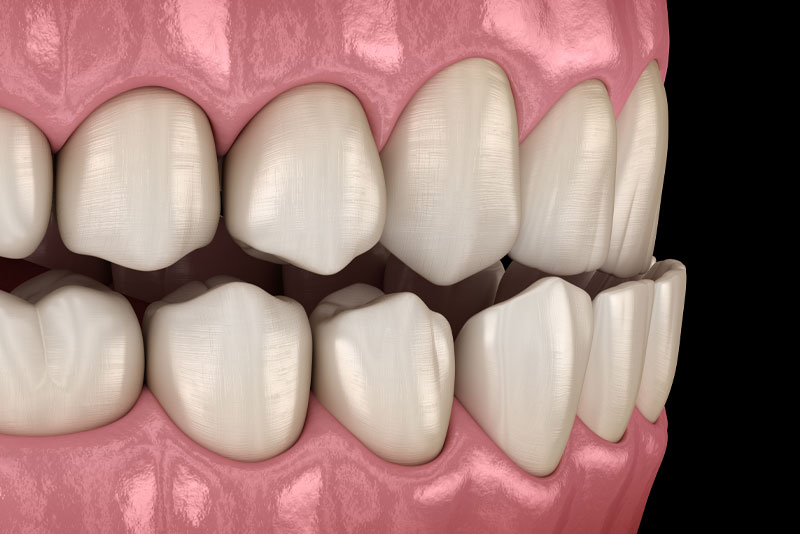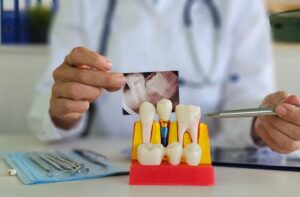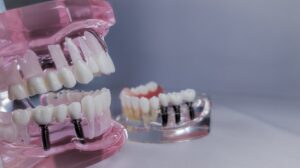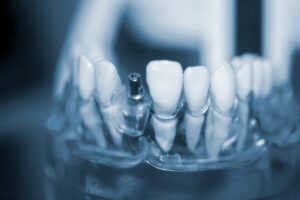Artificial teeth usually refer to dental implants and the restorations they support. This post is for anyone weighing options for missing teeth—whether you wear dentures, have several gaps, or face full-arch replacement. Read on for clear pros and cons of artificial teeth to help you decide, plus practical next steps if you think implants might fit your needs.
What are artificial teeth?
Dental implants are titanium posts placed into the jaw to replace tooth roots. They act as anchors for crowns, implant-supported bridges, or full-arch prostheses (often called All‑on‑X). With implants, the visible tooth is attached to a stable root-like implant so the result looks and functions like a natural tooth.
Common implant options include single implants (one implant + one crown), implant-supported bridges (two or more implants supporting several teeth), and All‑on‑X or full-arch solutions that use multiple implants to hold a whole set of teeth. Artificial teeth differ from removable dentures because they are fixed or securely attached, reducing slipping and improving chewing strength.
Key benefits of artificial teeth
Improved chewing, speech, and appearance
Artificial teeth restore bite force, which helps you eat more foods comfortably. Because the crowns are shaped and colored like real teeth, they improve your smile and often make speech clearer compared with loose dentures.
Bone preservation and long-term value
Implants stimulate the jawbone, helping slow the bone loss that follows tooth loss. While the upfront cost is higher than some options, implants often last longer than bridges or dentures, making them a good long-term investment for many people.
Modern digital workflows
Digital tools make implant care faster and more predictable. Intraoral scanners, facial scanners, and photogrammetry capture accurate records of your mouth and face. This precision helps plan implant placement and design artificial teeth that fit well and look natural, shortening treatment time and reducing surprises.
Potential downsides and risks
Surgery, healing time, and complications
Placing implants requires surgery and a healing period. Common risks include infection, bleeding, and swelling. Healing can take weeks to months, depending on the case. Certain factors raise the risk of problems—smoking, uncontrolled diabetes, and other serious medical conditions can affect healing and implant success.
Cost, time, and possible need for extra procedures
Artificial teeth can cost more up front than dentures or bridges. Some patients need extra procedures first, such as bone grafts or sinus lifts, which add time and expense. Multiple visits are often needed before the final artificial teeth are attached.
Maintenance and rare long‑term issues
Implants need regular care—daily cleaning and routine dental checkups. Rarely, implants can fail due to infection around the implant (peri-implantitis) or mechanical issues with the prosthesis. Repairs or replacements are possible but less common when patients keep good oral hygiene and attend follow-ups.
Are artificial teeth right for you? Next steps
Who makes a good candidate
Good candidates generally have:
- Reasonable overall health and controlled chronic conditions
- Adequate bone quantity and quality or willingness to have bone grafting
- Good oral hygiene and commitment to maintenance
- Realistic expectations about treatment time, cost, and results
Alternatives include removable dentures or conventional bridges for those who aren’t candidates for implants or prefer lower-cost options.
Choosing a specialist and what to expect
For complex cases, consider a board-certified implant specialist. Dr. Michael Fioritto is one of only about nine board‑certified implant specialists in Ohio and treats challenging “no bone” cases using zygomatic, pterygoid, transsinus, and subperiosteal implant techniques. His practice uses facial scanners, intraoral scanners, and photogrammetry to keep the process digital and precise.
Dr. Fioritto has taught local dentists and labs the digital workflow for All‑on‑X, and the practice offers streamlined care for out‑of‑state patients—meeting the surgeon the day before surgery and returning home the day after, with the referring dentist handling postop checks and a final in-person check months later. The office provides free consultations and CT scans to help you learn if artificial teeth are the right choice.
Ready to find out if artificial teeth are right for you? Book a free consult with the team to review your CT scan, discuss options, and get a clear, personalized plan.






